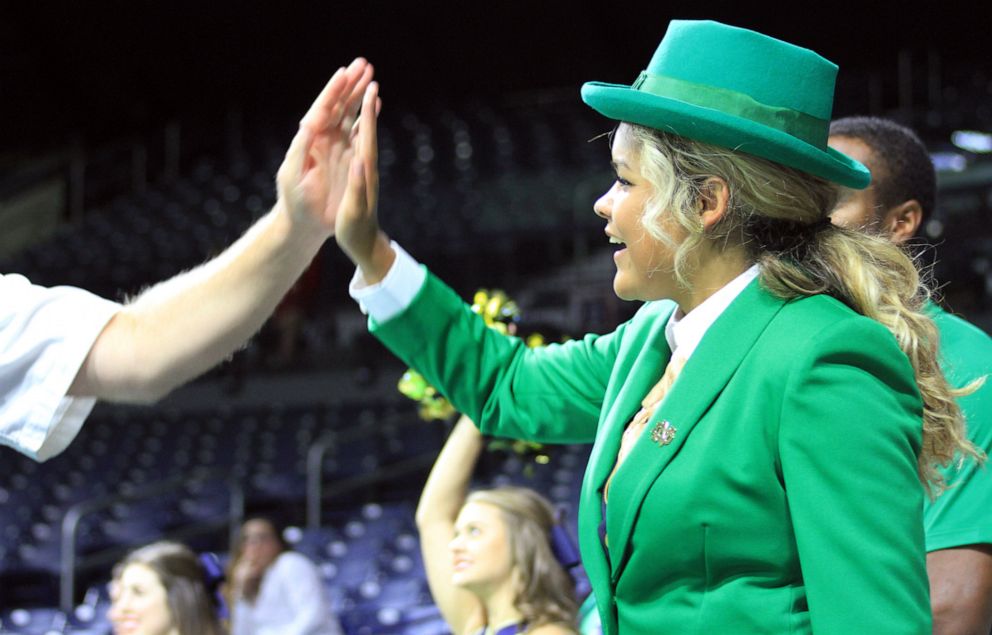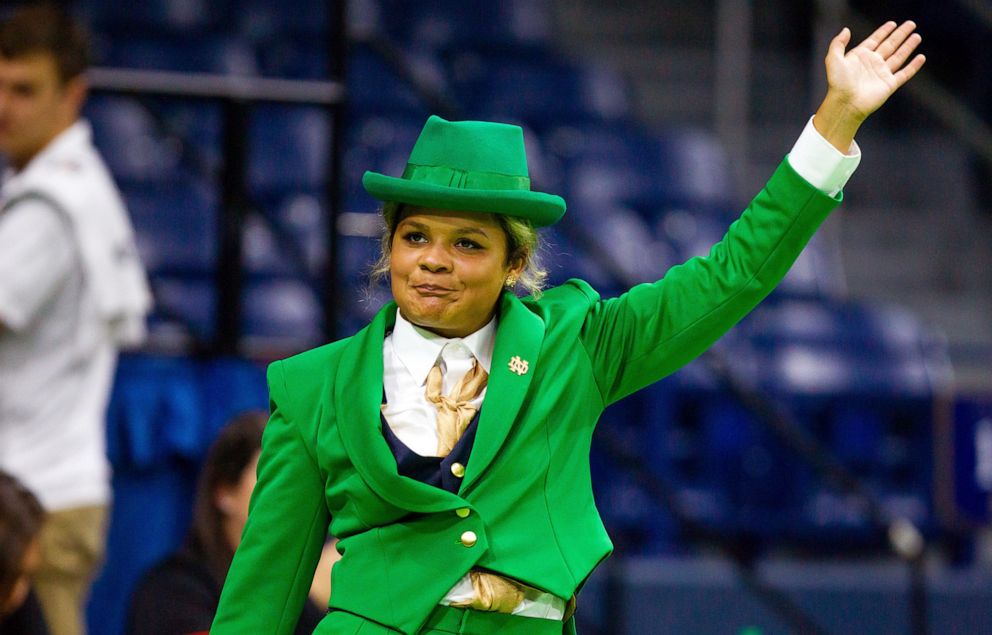Lynette Wukie, a junior at the University of Notre Dame, is making history one cheer at a time.
The Ohio native made her debut on Monday as the first female leprechaun in the Catholic university’s 177-year history.
“I’m happy to be in this position to show girls or anyone of any race or gender that you can do anything,” Wukie, 21, told “Good Morning America.” “I’m very excited.”
In addition to being the first woman to hold the prestigious mascot role, Wukie is one of only three African Americans in school history to hold the role.
She is in a three-person leprechaun class this year that includes another African American student, Samuel Jackson, and Conal Fagan, the first native-born Irishman to be mascot.
“I know all three of us are just really excited,” Wukie said. “It’s an interesting dynamic because we have kids look up to us and now we show a different representation.”
Wukie, a high school cheerleader, came to Notre Dame after breaking the glass ceiling in another sport: golf. She worked as the only female golf caddie in her hometown near Cleveland, while in high school.
Through caddying, she was granted the Chick Evans Scholarship, a four-year tuition and housing college scholarship offered to students who have made a job of toting golf clubs.
Once at Notre Dame, Wukie became a film, television and theater major and never thought she could become the school’s mascot until she was encouraged by a previous mascot to try out.
“I was very skeptical about whether I should,” Wukie said. “A lot of my fear just came from regular old stage fright and I think being a woman was a little off-putting too because there hadn’t been a woman predecessor.”
“I thought if I do all of this and don’t get it I’m going to be embarrassed because it’s a very public thing,” she added. “But I realized that if I wanted to do it, then all of that was worth it.”
Wukie submitted her application and was chosen as a top-5 finalist.
Her finals tryout consisted of performing in front of a mock pep rally, where she had to adapt, because all the uniforms were in men’s sizes. She was also interviewed by judges, where she said the topic of being a woman was discussed.
“One of the [judges] said it never crossed her mind that a leprechaun could be female and she apologized because she said it should have,” Wukie recalled. “I told her not to apologize because I didn’t think of it either.”
“It was one of those things where that’s how it’s always been and that’s how we always thought it would be, but here we are,” she said.
Wukie found out last April that she was one of the three students chosen to be a leprechaun. She spent the summer preparing for the role, including figuring out how to make it her own.
“We have done our best to keep the tradition but adapt it to me being female,” she said. “I still have a suit, but the pants are cuffed instead of cinched and both the coat and the vest are shorter so it’s more of how a women’s suit would look.”
“I wear an ascot type scarf, but I can also wear the tie if I want, it’s my choice,” Wukie added.
The Notre Dame leprechaun is one of the few collegiate mascots whose costume does not include a head piece. For many years, the leprechaun role came with gender and height requirements and required the ability to grow a beard, according to Delayna Herndon, a University of Notre Dame cheerleading coach.
“So far the reaction to having a female portray the leprechaun has been overwhelmingly positive,” Herndon told “GMA.” “[Wukie] truly is a role model for so many young men and women wanting to strive for whatever they’re passionate about.”
Wukie and her fellow mascots are considered student-athletes and train with the school’s cheerleading team. One mascot is chosen to cheer at Notre Dame football games, while all three, including Wukie, cheer on the school’s other sports teams, from soccer to volleyball and basketball.
Wukie said her fellow students recognize her on campus and she has already experienced young girls running up to meet her and give her high fives. The reaction is a far cry from the controversy she feared as a barrier-breaker.
“I think it’s something that’s natural with anything like this, when there’s a first, especially with gender, that something will come up,” she said. “Also being a woman of color, I feared there would be a lot of controversy, but I’ve heard only positive things both here and back home.”
“I hope that having a female leprechaun continues as a tradition,” Wukie added. “I hope I won’t be the only one.”
Source: Read Full Article

